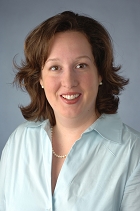Why Everyone Learns More When Students With Disabilities Are Included

Syracuse University
Julie Causton-Theoharis has researched the effects of inclusion on students with disabilities and those without. Research shows both benefit from being in the classroom toghether, she said.
More than 86 percent of charter schools do not enroll a single student with severe disabilities, according to a StateImpact Florida investigation.
School district data shows that students with disabilities are often clustered into a small number of specialty charter schools. Meanwhile, most charter schools enroll very few students with profound disabilities — if any at all.
Charter school advocates note that schools specializing in disabilities are opening across the state. Many readers responded with a shrug: “So what?,” they asked.
Researchers say those enrollment patterns matter because evidence shows both students with disabilities and students without disabilities learn more when placed in the classroom together.
“I think for a long time people thought inclusion was a good idea because it’s a social justice issue; because it’s really an educational right of all students to have access to the general ed content.” Julie Causton-Theoharis, an education professor at the University of Syracuse.
“But right now we’re pretty excited by the academic achievement gains of students with disabilities in inclusive settings. The other piece that’s a little surprising is the academic gains by students without disabilities.”
Those sentiments are echoed by Sandra Robinson, dean of the school of education at the University of Central Florida. Robinson recommended her granddaughter enroll in an elementary charter school operated by United Cerebral Palsy that serves a 60-40 mix of students with disabilities and without.
The school allows teachers in training to experience the classrooms of the future, Robinson said.
Critics of inclusion argue it is less cost-effective to educate students with disabilities and those without together. Schools which can concentrate in a disability reduce the need to hire outside specialists for therapy and other services.
Teachers have often opposed the idea, including the American Federation of Teachers in the 1990s. The British architect of inclusion once said the policy had a “a disastrous legacy.”
A common public perception — read the comments to our original story on NPR.org — is that students with disabilities are a distraction to teachers and classmates.
But advocates argue the extra resources spent to make classrooms inclusive pays dividends.
Often the classroom will have a general education teacher and a special education teacher. Those teachers will collaborate on lesson plans to make sure it’s tailored for every student in the classroom.
That is the case at UCP’s Orange County charters, where school leaders believe two teachers are better than one.
“Because you’ve got these two teachers teaching together and planning together they end up creating lessons that are far more differentiated, far more inclusive, often far more creative,” Causton-Theoharis said. “And all the students benefit from those resources being provided in the general education classroom.”
Causton-Theoharis often works with what she calls segregated schools to help them become more inclusive. She said schools are often reluctant to change at first.
“I think there is a lot of resistance and fear to inclusion. There’s always a vocal minority who says ‘This isn’t right; this shouldn’t be happening; these kids need to be separate,'” she said. “What we find after three years of working with a school is sometime those resistors are the ones that end up to be the biggest proponents of inclusion at the end.
“I have spent hundreds of hours in segregated classrooms,” she said. “I have yet to see a segregated classroom that is better than the general education setting.”


